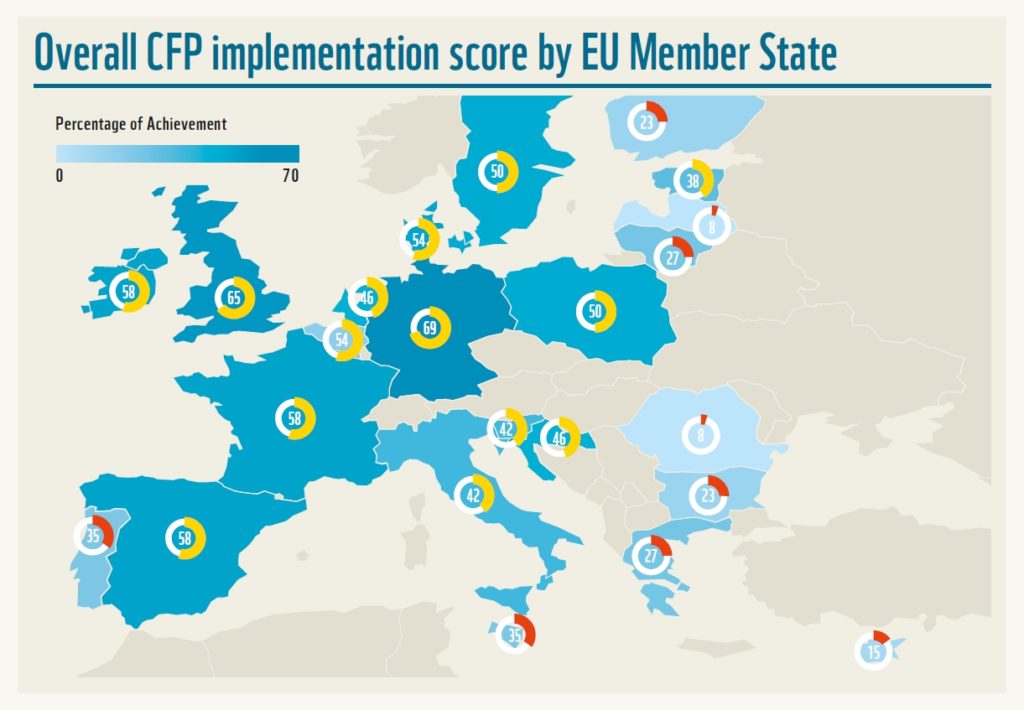EU Member States have had five years to implement measures within the Common Fisheries Policy (CFP), but are still lagging behind and are likely to miss important 2020 deadlines on biodiversity conservation and sustainable fisheries management. This according to a new report published by the Brussels-based office of the World Wide Fund for Nature (WWF) yesterday (11 December), presenting European and Member State decision-makers with an evaluation on the implementation of key articles of the CFP.
“EU Member States have had ample time to implement the provisions of the reformed CFP, but have demonstrated an unacceptable lack of political will towards sustainable fisheries management,” commented Samantha Burgess, Head of Marine Policy at WWF European Policy Office.
“European fisheries are facing unprecedented challenges, with high levels of overfishing, destruction of marine habitats, impacts of climate change, with continued illegal activities and poor management of the fisheries sector,” she added.
The report includes individual data for each EU Member State. Only one out of 46 CFP actions assessed by WWF was accomplished by all Member States (establishing an administrative system for registering fishing vessels). About half of the actions have only been partially accomplished, whilst the others have not been tackled to date.
On a number of key actions, the implementation score was in particular low for Latvia, Rumania, Cyprus, Bulgaria, Finland, Greece and Lithuania. Belgium has a score above average.
WWF also rated actions undertaken by the European Commission, and these findings show more encouraging efforts. The Commission has achieved nearly half of the implementation actions for the CFP, earning 47% of the maximum score possible.
1 January 2019 is the deadline for full implementation of the landing obligation by all EU Member States, whereby fishing vessels are required to retain and bring to port all seafood catches and count them against quota to eliminate discarding (returning unwanted catches to the sea).
Analyses by WWF have found that exemptions (derogations), allowing operators to discard up to 7% of their catches, have increased by 300% between 2017 and 2018. Phasing-in implementation of the landing obligation to January’s fast approaching deadline has not reduced discarding, nor brought the much-needed changes to make fishing practices more sustainable.
WWF analysed 46 articles with measurable actions and deadlines. Asked by The Brussels Times about the most important fisheries policies goals, the Fund replied that all CFP articles should be seen as a whole and as part of a system intended to help achieve sustainable fisheries in Europe.
“However, the challenge with this complex piece of legislation is that many of the articles aren't measurable or don't have specific deadlines,” WWF explained.
Overfishing
How do you explain that the goal for discarding fish has not been achieved? “The landing obligation is viewed as a major challenge by many fishers across the EU and lack of the European Maritime and Fisheries Fund (EMFF), which has resources dedicated to supporting fishers in the transition, demonstrates why the transition has been difficult,” replied WWF.
Some species are currently overfished, says WWF. “The risks are different to various species dependent on the seas basin they are located in. In the Adriatic Sea, anchovies are heavily overfished, in the Western Mediterranean Sea, hake is overfished, while eel in the Baltic Sea is included in a list of critically endangered species.”
“There is still significant conflict between targeting commercial fish species and endangered species which are caught as bycatch or unintended catch in the course of commercial fishing activities.”
Enrico Brivio, European Commission spokesperson for maritime affairs and fisheries, told the Brussels Times that the Commission welcomes the WWF report. The report was also discussed at a hearing in the European Parliament last week.
“The Common Fisheries Policies has been in force for only five years and some of its provisions, such as the landing obligation, will enter into full force only next year,” he says. “The report is an opportunity to assess the progress. Good progress is reported for certain fisheries and sea basins. In the North East Atlantic, biomass increased by 40 % since 2013.”
“Even if Member States have fallen short on individual targets, fishing in some sea basins has on average fallen close to maximum sustainable yield. Of course, lack of progress in the Mediterranean is a major concern.”
“A three pillars approach (economic, social and environmental) to achieve sustainability is working but there is still more work to do,” Brivio summarises. The Commission urges Member States to improve the low take up of the funding available under the fisheries fund to help implementing the landing obligations.
He explains that the use of derogations increased substantially because the obligation, following a gradual introduction, starts to be fully applied only next year and thus now covers more fisheries. In some cases, temporary exemptions were granted on condition that Member States will produce the necessary data.
The Brussels Times

